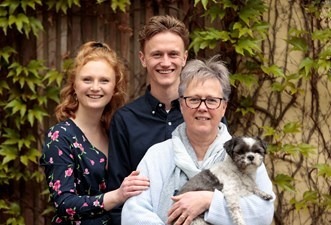
Patient interview – Monique from Netherlands
This article is the transcript of an interview that took place in 2019 featuring Monique, a person with CML living in the Netherlands.
How old are you?
I’m 57.
When / how long ago were you diagnosed with Chronic Myeloid Leukaemia (CML)?
I was diagnosed with CML on the 19. of September 2000, three days after my son’s third birthday.
Did you have any symptoms before you were diagnosed? If so, what were they?
For the first half a year I felt very tired. Tired without any specific reason. My feet itched terribly and I scratched them. When I got the medicine, this problem was gone within a week. My spleen was hurting.
Can you describe the diagnosis and how long it took?
In May 2000, I went to the doctor because i was feeling very tired. She sent me home with the following note: “it is logical that you are tired, two little kids, a job and a husband who works more than 60 hours per week. It is almost holiday, so you can take a break.”
In September I went back to the doctor and said to her: “Vacations are over and I’m still tired. I had to go by train to Switzerland because I was so tired that I couldn’t drive my car.”
Then she said: “Okay, then we’ll just do a routine blood test.”
Three days later I went to the hospital for the blood test and 10 hours later I got the suspected diagnosis. CML.
Can you describe who you saw, and the healthcare setting, when you received the diagnosis?
I did my blood test at 9 o’clock in the morning and then I went back to work. When I came back home, my family doctor rang the door bell. She told me that my blood had been checked in the lab. They found out there were too many white blood cells. She told me that she suspected that I have leukaemia and that I should go to the hospital right away.
Can you remember any thoughts or feelings you had when you first got the diagnosis of CML?
I worked all day and just came home as usual. I didn’t fully realise what my family doctor had said. I was very surprised and couldn’t believe what I had heard. I think my mind was blocking, a kind of blackout because I reacted as if nothing was wrong. I asked, if that was a normal reaction in this situation, if I could still have something to eat and take a shower?
At that time it felt like the doctor was speaking about someone else, not about me
How did the diagnosis affect you and your life?
The diagnosis of leukaemia hit like a bomb. The first year you live in a daze and I can describe it as survival. Actually, the most worrying thing was that, at that time, there were no medicines. Stem cell transplant was the only option. To know that you could die because there are no medicines is quite terrifying. Fortunately the first medication arrived quickly!
Strangely enough, I quickly got used to the diagnosis and easily settled into the rhythm of blood tests and check-ups. My blood values were already good 3 months after I started medication but the check-ups always remained frightening. Indeed, these were snapshots. In between two results I mostly didn’t think about leukaemia and didn’t worry much either. As long as the results were good. But if there was a slightly higher value with the next check-up, it grabbed me immediately. Dealing with side effects were much more difficult. I suffered a lot from fatigue and this put a lot of pressure on my daily life, my relationship, family, work and free time.
How did your friends and family react? How did it affect them?
I lost my job. The first years I stayed at home and I tried to get on with my daily activities, as normal as possible. For 10 years I had the feeling of just “following myself”. I simply had too little time and energy. The 8 hours I was awake, I was feeling tired.
For example, I used to go to town for a full day twice a year with both children to buy new clothes and shoes for the coming season. With CML I was completely exhausted after two hours. This was a big challenge but I preferred this instead of shopping every month, which I really couldn’t handle.
When the kids were at school I laid on the couch but when everyone was back home, dinner was always ready.
When I went to a party in the evening, I felt exhausted within an hour and I could only think about my bed. I started to go to less and less parties or social events. I didn’t want to be a burden for anyone. I never asked for help but when I look back I should have done this.
Leukaemia wasn’t any good for my relationship either. My partner was unable to support me with my illness. He wanted to continue his life and not have to take care of someone. The illness was not his problem, but mine. In the end, our relationship didn’t make it.
How did you deal with your feelings? Did you find that any specific activities / past times / emotional outlets / people helped you?
I had to stay in the hospital for one week after diagnosis. The care I was surrounded with there helped me to not feel alone. Everyone took care of me. That felt good. People always asked me how things were going and how I felt. I received a lot of support. I felt acknowledged.
In my family it was different. When I got home from the hospital, everyday life just went on. We didn’t discus my illness and the consequences for me and them. We didn’t talk about it and I never got the feeling that people worried about me. When I look back, I know I didn’t allow my family to take care of me. I didn’t ask for help or support. I just waited for someone to offer help. I didn’t want to be weak. I wanted to protect my family and I wouldn’t be able to if I was weak.
Looking back, I remember 3 conversations with my physician in the academic hospital which have been the most valuable for me:
1- When I first met him I told him: ‘I put my life in your hands, I will trust you make things alright” He said: “I don’t know but I’ll try.”
2- After 10 years, he asked me if I would like to stop taking medications. I asked if it was safe to do and he answered: “I don’t know what will happen but trust me.”
3- 3 years after stopping, I asked him about the serious side effects I still had. He said: “we do not know why this is happening, but just hold on.”
There was never a clear answer but I could read in his eyes that I could trust him. I hold him ‘responsible’ for saving my life, giving me back my life and giving me trust in my future
There was never a clear answer but I could read in his eyes that I could trust him. I hold him ‘responsible’ for saving my life, giving me back my life and giving me trust in my future
Can you recall how your feelings changed over time, if they changed, once the diagnosis had sunk in, and how you felt later on?
Shortly after diagnosis I signed up as a member of the patient organisation. A year after diagnosis I was a volunteer. This helped me to cope with what happened to me, the diagnosis and all the other things that I encountered. By helping others I could also help myself. As a result, I have increasingly expanded my volunteer work. I feel good about this because I can do something for others.
What impact would you say CML has had on your life?
Nothing has remained the same. I was thrown on a roller coaster and no one could stop it. Looking back on those 19 years, I can only say that I have a more valuable life, that I have experienced spiritual growth and that I have become a better and nicer person not only for myself but also for others. The price was high but without CML I would not have achieved what I have achieved. I am satisfied with that and feel no resentment.
Have you found that certain things or people help you to live with CML?
Yes, the patients in the Dutch patient organisation Hematon and CMyLife.
Can you tell me how you have adapted to living with CML?
My own inquisitiveness and willingness to put my shoulders to the wheel helped me to cope with this disease. I never sat down and this helped me a lot. Now, I no longer take medication and it feels like I’ve got my life back. I have my energy back even though my body has suffered from the medication. I always say that time is your enemy but also your friend. In 2000 CML was a deadly disease but I had time to wait for medication, time to stop and now time to do my work as a volunteer and most important to see my children Loes and Rens grow up.

Monique with her children Loes and Rens
Can you describe any specific challenges you have faced since you were diagnosed and how you have overcome them?
The biggest challenge was in 2001 when there was no medication and the physician advised me to go for a stem cell transplant. This was a very difficult period because I realised that I could die not only because of the stem cell transplantation but also of getting no medication. This was a tough journey mentally. I had two small children aged 3 and 5. The fact that I could not explain to them that I might die made me sad and feel powerless.
Stopping medication was also a major challenge. It was difficult to let go of the feeling of safety that the medicines provided. It took me two days of crying and worrying. In the end I decided to call a CML-friend who told me: “Monique don’t you realise that you get a second chance?” And then I went for it.
What advice would you give if you were talking to someone who has just been diagnosed with CML, or to anybody living with CML?
Find people who have CML and talk to them. For people in the Netherlands, become a member of Hematon, the patient organisation. Meet other CML-patients and ask for the right information about your illness. Attending meetings can also be important to share your questions, concerns and fears. Also take a look at CMyLife (in Dutch). There you will find the right information and can discuss your questions.
Hematon https://www.hematon.nl/
CMyLife https://www.cmylife.nl/
